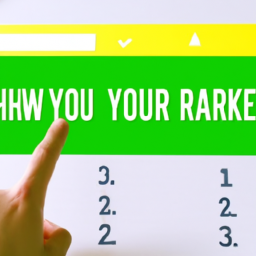7 Proven Strategies to Help Boost Your Websites Google Ranking
Table of Contents []
How To Rank Your Website Higher On Google
Introduction
For businesses trying to make it big in the digital world, SEO (Search Engine Optimization) has become essential. SEO helps businesses rank higher on Google and generate more organic traffic. As part of a good SEO strategy, businesses need to create highly detailed and descriptive pages with relevant topics. This article provides 8-12 topics for a detailed and descriptive page, followed by popular and relevant subtopics, so businesses can create an effective SEO-friendly page and rank higher on Google.
Topic 1: Keyword Research
Keyword research is a crucial step for SEO success. Identifying the right keywords is essential to ensure high ranking on Google. Popular subtopics for deeper understanding and description include:
1.1 How to Conduct Proper Keyword Research
Keyword research is an important part of the SEO process. It helps marketers find the keywords that their prospective customers are most likely to use in their searches. Marketers should focus on long tail keywords that are more specific to their businesses, as they have less competition and are more likely to generate organic traffic for their sites.
1.2 Use of Keyword Research Tools
There are several keyword research tools available on the market. These tools enable users to track and analyze the success of certain keywords used on their sites, as well as the competition. Such tools are especially helpful when it comes to identifying and targeting the right keywords for successful SEO.
1.3 What to Look for in a Keyword
When choosing the right keywords for SEO, marketers should consider factors such as relevancy, search volume, and keyword difficulty. It is important to choose keywords that are relevant to the topic or product you are trying to promote. It is also important to consider the search volume to ensure that the keyword is commonly searched. Finally, keyword difficulty is an important factor as it indicates the competition for the keyword.
Topic 2: On-Page Optimization
On-page optimization is a key step in SEO. It involves optimizing website elements such as content, titles, meta descriptions, and images for improved ranking on Google. Popular subtopics for deeper understanding and description include:
2.1 How to Optimize Content for SEO
Content optimization is one of the most important steps when it comes to search engine optimization. Content should be written with the goal of making it as relevant and interesting as possible. Content should also include the target keyword multiple times and use semantic keywords to link different pieces of content together. The use of headings and keywords in the alt-text of images also helps with content optimization.
2.2 Keyword Optimization
Keywords are an essential part of on-page optimization. Targeting the right keywords is essential to ensure improved ranking on Google. Keywords should be used in the URL, titles, meta descriptions, and throughout the text to create a keyword-rich page. It is also important to use semantic keywords to increase relevancy and create links between different pages on the website.
2.3 Optimization of Images and Videos
Images and videos also require optimization. Using the target keyword in the image filename is helpful for better ranking. Additionally, using the keyword in the image's alt-text can help to optimize the content. Videos should be optimized using the keyword in the video title and description. Embedding videos and linking them to other relevant pages can also help with ranking.
Conclusion
Creating a descriptive page with relevant topics and detailed descriptions is essential for SEO success. Businesses should focus on keyword research and on-page optimization to rank higher on Google. This article can be used as a guide for businesses to create a detailed, descriptive page and increase their ranking on Google.
